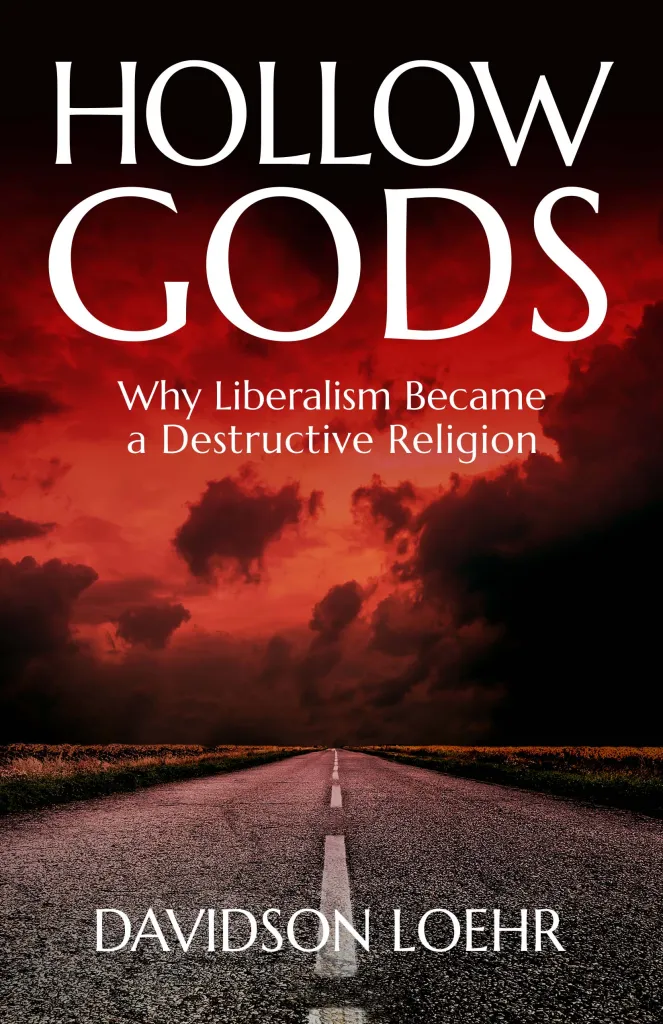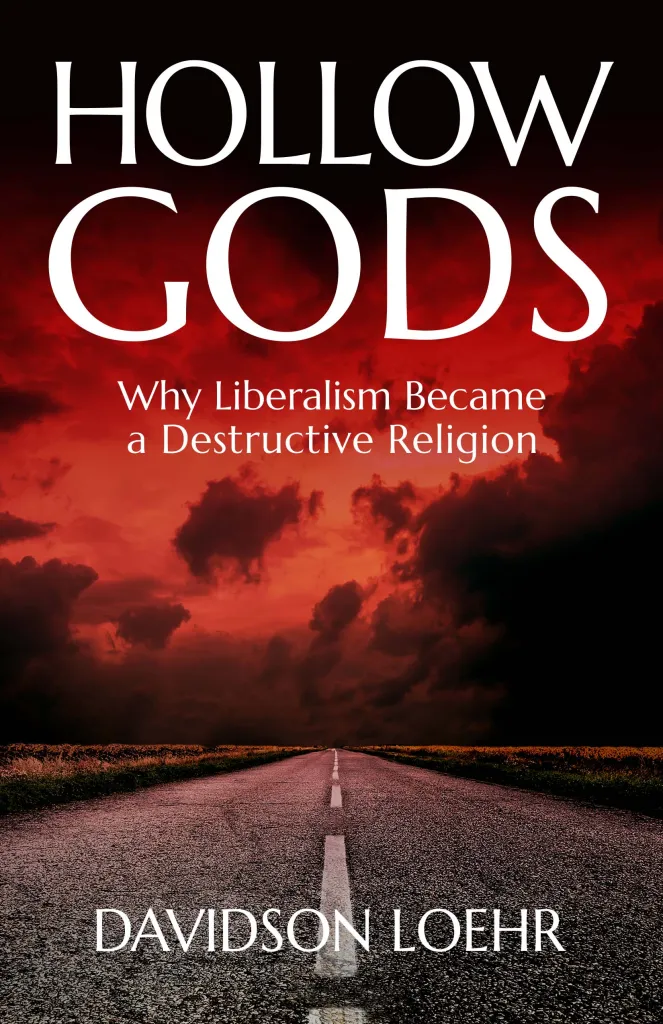The theorists of modernity believe that with the progressive march of modernization, religion will have a very limited role to play. Contrary to expectations, the rise and growth of science and the spread of modernization have not been accompanied by the decline of religion in human life.
Durkheim was right when he said, “A society cannot survive without the sense that the members of that society are bound together by shared values and norms. Religion is one of the primary ways that these shared values and norms are expressed and reinforced.” (Durkheim, 1912). Religion has transformed itself into distinct manifestations in the contemporary world. While some would say that technology and science are a new religions, Davidson Loehr believes, with many others, that liberalism is the new and destructive religion.
“Liberalism has become a religion without a God, focusing on virtue signaling and moral superiority.” – Andrew Klavan

In HOLLOW GODS: Why Liberalism Became a Destructive Religion, Davidson Loehr presents a thought-provoking sociological analysis of the societal implications of liberalism as a dominant ideology. Loehr, a theologian, philosopher, and retired minister delves into how liberalism has transformed into a quasi-religious belief system, examining its effects on social institutions, cultural norms, and individual identity.
Liberalism as an ideology has been a subject of extensive sociological inquiry, with scholars offering diverse perspectives and analyses. Some sociologists have examined the positive aspects of liberalism, highlighting its emphasis on individual freedoms, human rights, and social justice. Others have critiqued liberalism’s potential limitations, particularly to the concentration of power, the exclusion of marginalized voices, and the commodification of social values.
Loehr’s central premise revolves around the notion that liberalism, particularly in its contemporary form, has taken on religious characteristics, wielding influence and shaping societal structures akin to organized religions. He argues that adherents of liberalism exhibit fervor and dogmatism that mirror religious zeal, as well as a tendency to stigmatize dissenting voices. Through extensive historical, political, religious, and sociological research, Loehr explores through concepts such as group identity, victimhood culture, and the impact of ideology on social institutions, weaving together a comprehensive multi-faceted analysis that sheds light on the societal transformations brought about by liberalism.
One of Davidson Loehr’s most eye-catching arguments is how liberal ideals have invaded educational institutions, affecting student life and shaping the campus environment. As a result of liberal values and social justice, campuses have become increasingly politicized. Students are encouraged to engage in activism, advocacy, and the pursuit of social change. The ideology permeates various aspects of campus life, from curriculum development and faculty hiring practices to student organizations and campus policies.
The author explores how students, often driven by the desire to create a more just society, immerse themselves in this utopian vision. They participate in social justice movements, engage in dialogue around identity politics, and challenge existing power structures. However, Loehr also raises concerns about the potential dangers of an unchecked pursuit of liberalism within educational institutions. He cautions against the suppression of dissenting voices, the exclusion of diverse perspectives, and the stifling of intellectual freedom in the name of advancing a singular ideological agenda.
As quoted by Davidson Loehr, “Our character becomes essentially fixed by our mid-20s.” This is particularly relevant for understanding how individual development shapes personal beliefs over time. Loehr suggests that by the time individuals reach their mid-20s, their fundamental character traits and belief systems have largely formed. This concept emphasizes the importance of critical thinking and self-reflection during early adulthood, as the ideas and ideologies one adopts during this period may shape their long-term worldview.
The concept of eutopia is particularly important in understanding the entirety of the author’s argument. Eutopia, derived from the Greek term meaning “good place,” represents a more practical and incremental approach to societal improvement. Loehr argues that while utopian visions often lead to grandiose ideologies and an all-or-nothing mentality, eutopia acknowledges the limitations and complexities of the real world. It emphasizes the importance of small-scale, practical changes that can lead to tangible improvements in individuals’ lives and society as a whole.
By advocating for eutopia, Loehr encourages a more realistic and nuanced approach to social change. His exploration of eutopia challenges readers to reevaluate their understanding of ideal societies and consider the impact of incremental change within the constraints of reality. It promotes a more compassionate and flexible approach to creating a better world, one that prioritizes human dignity and addresses the complexities of social issues.
Loehr’s analysis challenges readers to critically examine the potential pitfalls of unchecked and unbalanced liberalism. He argues that the liberal framework, when taken to extremes, can suppress dissent, limit intellectual diversity, and inhibit meaningful discussions about complex social issues. The author posits that a healthy democracy requires a balance between progressive ideals and the preservation of core democratic values, such as free speech and the respect for differing opinions.
One of the strengths of HOLLOW GODS: Why Liberalism Became a Destructive Religion is Loehr’s ability to seamlessly blend sociological theory with real-world examples, making the book accessible to both academic and general readers. Moreover, the book challenges readers’ assumptions and prompts self-reflection. By presenting alternative perspectives and raising thought-provoking questions, he encourages readers to engage in honest and open dialogue about the limitations and potential dangers of any ideological extreme.
However, it is important to note that the book’s title, HOLLOW GODS: Why Liberalism Became a Destructive Religion, may mislead readers into expecting a broad critique of liberalism as a whole, rather than an exploration of its potential excesses. While Loehr does provide a critical examination of specific manifestations of liberalism, it is crucial to remember that liberalism encompasses a wide spectrum of ideas, encompassing diverse political, social, and economic perspectives.
In terms of writing style, Loehr presents his arguments with clarity and conviction, making the book accessible to a broad readership. He draws upon a range of sociological theories and empirical research to support his claims, providing readers with a solid foundation. He incorporates vivid anecdotes and interviews with individuals from diverse backgrounds, providing a human element that resonates with readers. The author’s ability to balance academic rigor with relatable storytelling creates a captivating narrative that keeps readers engaged throughout the book.
Personally, this book connected with me at various levels. For someone who believes that religion is one of those social identities, which can overwhelm every other identity we hold, and this power of religion reaches its zenith when the sacred realm is manifested in profane, which makes ordinary and monotonous synonymous with spiritual and transcendental. Loehr makes the same argument when he explores his argument that everything, everywhere and every time, is all about religion. He also argues how liberals have been successful at manifesting religion in a form that is profanely available and accessible to everyone as against thebiblical God. Moreover, as someone who has been a witness to rising identity politics, the politicization of educational institutions, and aggressive debates around liberalism, a sense of resonance can be felt within the pages, lines, and arguments of the book. Finally, I believe that liberalism as a religion is the hypervisible manifestation of Marx’s view of religion which states that religion is the soul of soulless creatures.
In conclusion, HOLLOW GODS: Why Liberalism Became a Destructive Religion by Davidson Loehr is an intellectual, educational, political, racial, and religious tour de force that offers an engaging and comprehensive examination of the transformation of liberalism into a quasi-religious belief system. Davidson Loehr’s exploration of liberalism’s transformation into a quasi-religious belief system and its potential consequences for democratic discourse stimulates important discussions about the role of ideology in shaping social institutions and individual identities. Instead, readers must approach the book with critical engagement, acknowledging the multifaceted nature of liberalism and the need for a balanced assessment of its merits and shortcomings. Thus, HOLLOW GODS: Why Liberalism Became a Destructive Religion is an essential journey of reflections about oneself and the society around to discover, re-think, unlearn and deliberate over ideologies, especially liberalism and how it has come to be manifested in the contemporary world.

Experience a mind-expanding journey through the pages of “HOLLOW GODS: Why Liberalism Became a Destructive Religion” by Davidson Loehr. This thought-provoking book delves deep into the transformation of liberalism, once a bastion of progressive ideals, into a dogmatic belief system with societal consequences. Loehr’s captivating blend of sociological theory and real-world examples challenges established narratives and prompts introspection. Explore the potential pitfalls of unchecked liberalism, and its impact on democratic discourse. With clarity and conviction, the author navigates readers through a fascinating exploration of ideology’s role in shaping our society. Buy “HOLLOW GODS” on Amazon now and reshape your worldview! #LiberalismDebate #MustReadBook
Read: Exploring ‘Hollow Gods’: An Interview with Davidson Loehr

